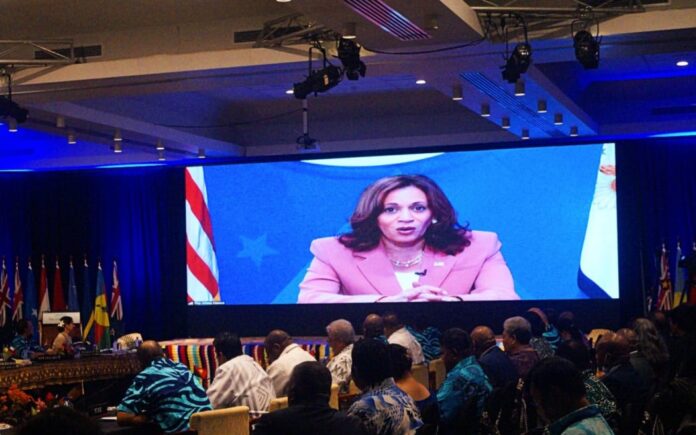By MICHELLE AUAMOROMORO
THE future of the South Pacific Tuna Treaty will enhance broader regional and geo-political relations, says Fiji’s Minister for Fisheries, Semi Koroilavesau.
He said this in a brief press conference after the United States (US) renewed its engagement to the Pacific region by pledging an assistance of US$60 million on the treaty in the next 10 years, a total of US$600 million.
This announcement was made by US Vice President Kamala Harris when she joined the Pacific Islands Forum (PIF) Leaders Meeting virtually in Suva, Fiji last week.
Koroilavesau said the treaty offered the opportunity for greater cooperation, interest in the Pacific across sectors and issues like maritime security, sustainable fishing, and economic growth.
“While we continue to appreciate the spirit of the treaty being fisheries access and development opportunities, we also recognize the unfolding potentials that the treaties can provide for our relationship,” he said.
The South Pacific Tuna Treaty had been serving as a cornerstone of political and economic cooperation between the United States (US) and 16 Pacific Island countries for over three decades since entering into force in 1988.
The treaty allows for U.S purse seine vessels to fish in the exclusive economic zones of the Pacific island countries party to the treaty.
Parties to the South Pacific Tuna Treaty are Australia, Cook Islands, Federated States of Micronesia, Fiji, Kiribati, Marshall Islands, Nauru, New Zealand, Niue, Palau, Papua New Guinea, Samoa, Solomon Islands, Tonga, Tuvalu, Vanuatu and the United States.
Meanwhile, the Prime Minister of Papua New Guinea (PNG), James Marape voiced to the US that it wanted to get away from exporting raw tuna and move into downstream processing.
Marape, in a press statement said that he respectfully told Harris and the world that PNG and Pacific will no longer be exporting raw marine catches only as they wanted to move into downstream processing for their catches and resources in their respective countries.
“No more raw resource export in primary stage but processed finish products.
“For PNG, we will give opportunity to all present in our resource sector to translate their licenses too- not just harvest and export raw but to do manufacturing for finished product export.
“Any new investors wanting to come in to work in all our resource sectors, including fisheries, must include downstream processing and manufacturing in your applications.
“Gone will be the days when we were just primary exporters.
“We want to add value to our economy by manufacturing our products in-country and in the Pacific and supplying our local and regional markets as well as the bigger overseas markets,” he said.


